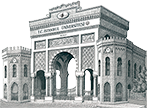Dean's Message
The Message from the Dean
Istanbul University’s Faculty of Theology was the first of its kind in our country. Our faculty’s foundational principles are to train competent theologians who can produce beneficial and practical knowledge laid down by the Darülfünun-ı Şâhâne’nin Ulûm-ı Âliye-i Dîniyye (Darülfünun of Istanbul ) which was founded in 1900. The advent of the Tevhid-i Tedrisat Law in 1924 meant that the Darülfünun of Istanbul incorporated our faculty as part of the larger university complex. It was during the same year in May that the faculty begun to accept students. This is how our faculty came to be one of the five foundational faculties of Darülfünun of Istanbul later to simply be named Istanbul University. Significantly, it is worth noting that the origins of the institution stem back to the establishment of the Seljukian madrasah system. Additionally, it is also worth stressing that the curricula of the historically famous Fatih and Suleymaniye madrasahs as well as the Darülfünûn-ı Osmânî along with the accumulated knowledge of the many esteemed scholars of these centers of learning have passed on the foundations of the institution making their way to us, embedded into the fabric of the faculty. The experiences of the Tanzimat and Republican period and the reforms and regulations during those eras are furthermore part of our composition. Our faculty now advances that tremendous historical heritage with almost two hundred academic personnel while at the same time not compromising objectivity and quality but instead working in complete harmony with our ethical principles and universal values. Our sole purpose is to continue to add new branches and maintain the vibrant synthesis between the roots and branches to this ancient tree.
In this globalizing world, it is imperative to be in touch with the various languages, diverse cultures and religions while equally appreciating this as an opportunity to further our horizons to make this world a better place. At Istanbul University this opportunity is utilized to better connect and understand the world we live in by participating in exchange programs allowing the interchange of ideas and experiences with such activities opening new possibilities and prospects for our students. Thanks to the Mevlana, Erasmus and Farabi exchange programs that serve this purpose along with our international theology program, our students are able to connect to various traditions from both East to West, enriching an experience unique to us while having an impact on what lies beyond us. Besides our program in Turkish, Arabic and English undergraduate and graduate programs act as the main columns that maintain the multicultural structure of the faculty. For our students these programs provide on the one hand direct access to the vast corpus of Arabic and Western intellectual scholarship, while on the other hand also facilitating educational opportunities for students coming from around the world.
The basic dynamics of the civilization of Islam owes much of its existence to this multicultural and intellectual habitat of which our faculty is an example. The fact that the faculty accepts students after examining them in Arabic and Persian while also incorporating students with a madrasah education symbolize the lively contact with scholarly knowledge that we have inherited. Besides the fundamental courses on the Islamic sciences our curricula also include courses on logic and philosophy. The spiritual dimension of Islam is complemented with courses on Sufism whereas courses on the Islamic arts supplement an aesthetic dimension. In order to reach the larger web of scholarship that lies behind the civilization of Islam, courses on the history of Islam, history of Islamic sects and the history of religions are also part of our curricula. The task of combining this heritage with modern disciplines is undertaken mainly by the courses on religious education, psychology of religion and the sociology of religion.
We have proudly inherited a tradition that constitutes eminent pioneers in both spirituality and intellectualism, as well as being located on the crossroads of great civilizations by having access to diverse parts and the traditions of the world… All of these opportunities provided by our faculty come with a noteworthy responsibility. We are confident that our faculty can be a point of reference in elevating the academic activities it runs on a universal level, by claiming responsibility with a shared endeavor of our faculty members and students who pursuit knowledge, wisdom and good scholarship. Our primary purpose is to carry the scholarship we have inherited to advance levels and transmit it future generations. This is only possible with genuine intention and our collective efforts.
The effort is by us, success from Him.
Prof. Dr. Ramazan Muslu
Dean
